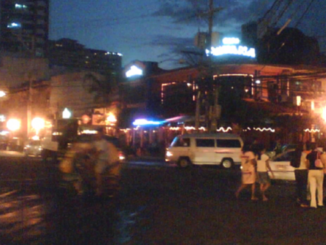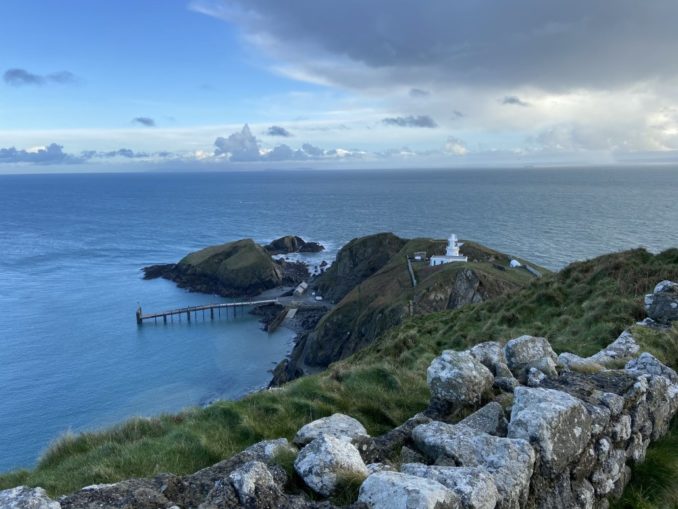
“I’ve just got back from Lundy Island.” These words are often greeted by furrowed brows and hazarded guesses as to its whereabouts. “Oh yes – somewhere in Scotland, isn’t it?” Hands up Postalliers who know? Hmm, quite a few, but many who are sitting with folded arms. Yes, twelve miles off the coast of Devon, served by the ports of Bideford, Ilfracombe and (rarely) Clovelly. Three miles long, half a mile wide. A storm-tossed lump of granite. The name is said to derive from the Old Norse meaning Puffin Island, but a recent theory suggests that it might stand for “Island of Berghaus.” I made that up. I’m here to tell you how to get there, and what to do when you do.
Well, if you don’t live in the west country it isn’t a stroll in the park. Mrs B and I have been going on and off for many years and it’s a bit more manageable these days, but still an effort. The island is leased by the Landmark Trust and that lease has just been renewed for fifty years. That means there are properties you can stay in if you don’t wish to endure a day trip. The properties range from yards away from the pub to a distant old Admiralty watch tower without electricity. It is the only property served by deliveries of bottled water, as the authorities are quite understandably trying to eliminate reliance on plastic: it may sound terribly eco, but they have to import the stuff and recycle it back again. Lundy now has potable water ( you have to ignore the coppery colour) so life is a bit easier. We live in Sussex so it makes sense for us to motor down to Devon and hole up overnight in one of the many inns and B&Bs. The island used to close over winter, but apart from maintenance month January it is now available to rent. Arrival is by a six-minute helicopter flight from Hartland Point, a bleak spot that sports a hut with refreshments for waiting passengers. There is a car park which is reasonably secure just by remoteness, though our glove compartment this time suggests an encroachment by very small creatures with a liking for toffee. Flights start about 11ish. Luggage is limited in weight and they are most particular. We got stung a fiver for a kilo over the odds last week. Passengers are also weighed and suitable allocations to flights are made. If you have done the B&B thing you at least arrive there reasonably refreshed, and there’s no doubt that the short helicopter trip is jolly exciting. You may be selected to sit up front with the pilot who, depending on his mood, might trot out the old chestnut “Is this your first helicopter flight? Mine too.” Six passengers in the back.
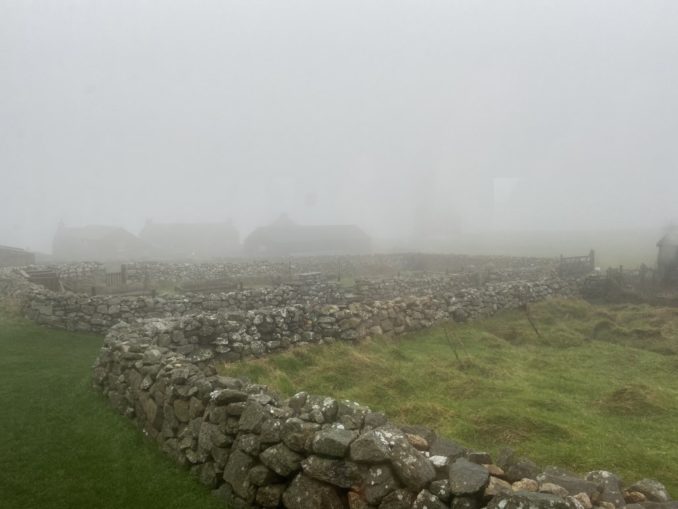
On arrival you attempt to get off without decapitation: all have succeeded so far. In winter the prevailing WSW Lundy gale hits you and a sharp intake of breath tells you you’re back. A quick registration in the office, then along to the shop a few yards away. It’s Puffin Central, having more puffin-themed knick-knacks than you can shake a walking stick at. Order a few vital supplies – a bag of coal at 12 quid being more important even than booze. The shop and pub run tabs for the duration, and the coal is delivered. Then to your property. I must confess that Mrs B and I have rarely strayed far from the village. First job is to light the Wenlock coal burner, and if you get it right it shouldn’t go out for your stay. Very cosy. The social life revolves around the excellent Marisco Tavern where the grub is good and the “Lundy” draught is from St Austell. Chaps caught short make use of the Grade 2 listed urinal, not for the faint-hearted in winter as it’s open to the skies. On a clear day you can see a dozen or more mainland lighthouses winking back at you as you go about your windswept business. Late nights in winter are unusual, but par for the course in summer. Much of the grub is centered on the island’s own lamb products. There is a farm leased to an agreeable ruddy-cheeked farmer from the mainland who owns the only dog allowed on the island. The staff muck in on everything and there are specialists – wardens, rangers etc who keep a minutely careful eye on the fauna and flora. Last week we came back on the helicopter with a chap who had done a seal count. A few years ago there was a concerted and successful plan to eradicate rats from the island: they played the very devil with nesting birds.
Many people come to Lundy with specific interests: bird-watching, climbing and even bell-ringing. The imposing church has recently been renovated to a very high standard from its almost derelict state of a few years ago. Whatever you do, though, it involves walking. The only vehicles belong to staff and the farm, and are not for the likes of you or us. Have walking boots, will travel. For such a small island there are some impressive walks between the two lighthouses. Our pals on the recent trip walked round the whole thing in a day although he was running on empty by the end: she had already completed a five-mile run earlier. Ho hum. Mrs B and I are a bit more sedate these days, but over the years we have seen the sights, like the crashed Heinkel, for instance (shamelessly included to attract the GP aviation set). One part of the walks ranges down the coastline where years ago rhododendrons were foolishly planted: the Himalayan shrub thought “This will do for me” and set about a rapid colonisation of the east coast. We recall sighting a distant purplish haze from the boat. The foreigner has been counter-attacked by working parties for many years now, but the roots are shockingly pervasive: the battle is not yet won. On the east side is also to be found the VC Quarry in memory of the son of an earlier owner who died of wounds in Burma.
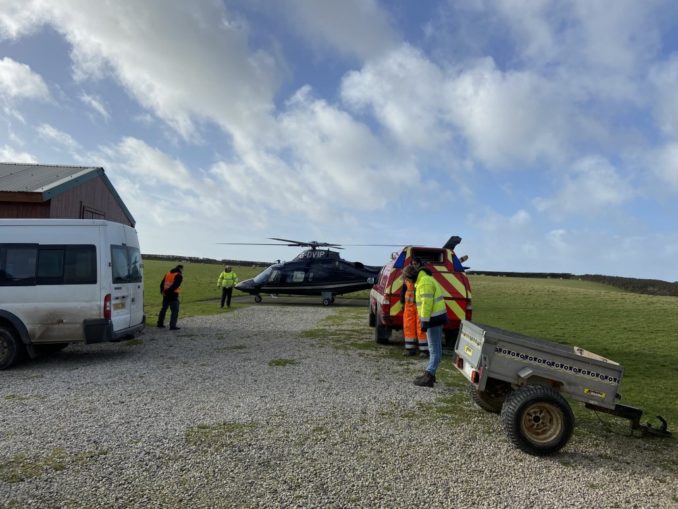
Lundy in summer is a gentler creature. The ruggedness becomes a bit mellower and the wind calms down. With it come the kids, of course, so it is more family-friendly. We prefer winter, he added, darkly. Getting there is by the Landmark-owned MS Oldenberg, an old German river boat which at one time was used to carry butter out of coastal waters to flog off cheap. What is it with Germans about butter (- and guns)? It plies from Bideford or Ilfracombe, and if you are unlucky, from one and back to the other. Sailings are with the tide and of course vary. The trip takes two hours – again, if you are lucky – and provides refreshments if you are up for it. On disembarking at the pier at Lundy your luggage is taken up the ramp to the village, and if you are a little indisposed they might even take you. Otherwise, you have to carry your own rucksack. We often used to drive overnight to catch an early sailing, so what I used to think of as the death march up the ramp bearing my and Mrs B’s rucksacks ( a courtesy I used to regret) just about finished me off. A breeze for the youngsters, though. Occupation of properties as above, but without the need for “phurnacite.” Long evenings are the order of the day.
Lundy has a long and chequered history which can’t be set out here. I will include one episode, though:
“Oliver Cromwell decided to take action and decreed that any captured corsairs should be taken to Bristol and slowly drowned. Lundy Island, where pirates from the Republic of Salé had made their base, was attacked and bombarded, but despite this, the corsairs continued to mount raids on the coastal towns and villages in Cornwall, Devon and Dorset”
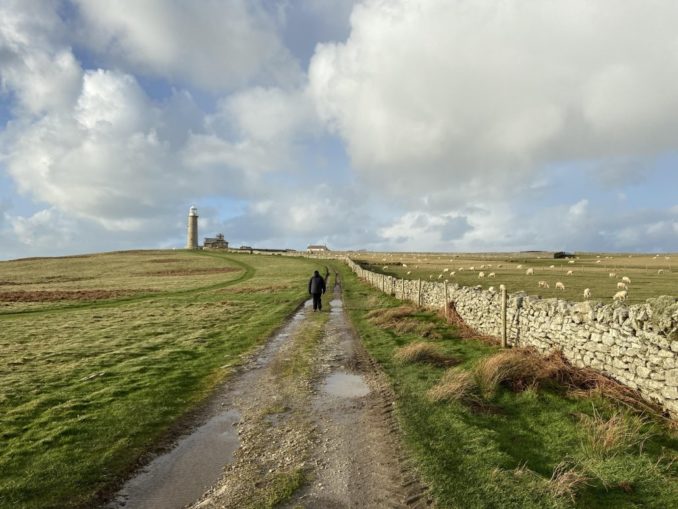
There is absolutely no doubt that there is something about the island – the word magical is not too extreme. Visitors return time and again, and the place doesn’t disappoint. The light, the ruggedness, the sheer wildness of the place. Our recent trip was to celebrate Mrs B’s [..]th birthday, which by a happy accident fell on Independence Day. Our friends are Guardian-reading Remainers, but we stepped round all that. Mrs B and I did log onto GP in the privacy of our room so had all the fun of the fair. You have to take the rough with the very rough on Lundy. Our departure day dawned foggy and flights were cancelled. This has happened to us on the mainland as well. No problem to the retired among us. We got off successfully the next day in the chilly sunshine.
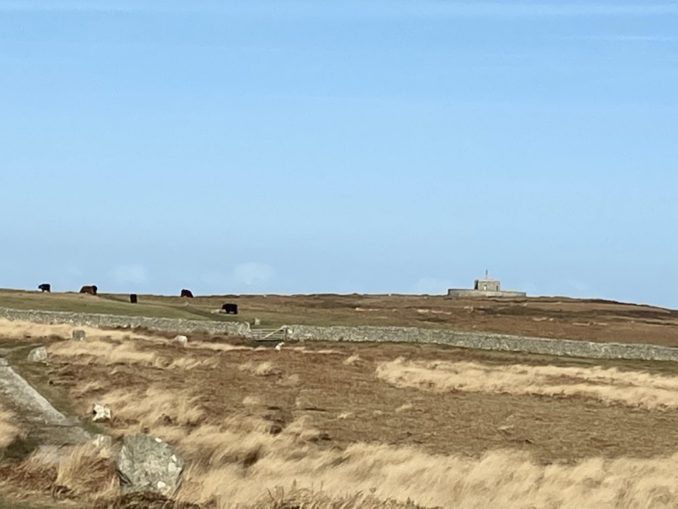
No TVs, haphazard mobile signal, decent grub and beer – a place to cherish and explore while experiencing the strange remoteness. I commend it to the House.
Ed. But what about the puffins?
© Bassman 2020
The Goodnight Audio file
Audio Player


